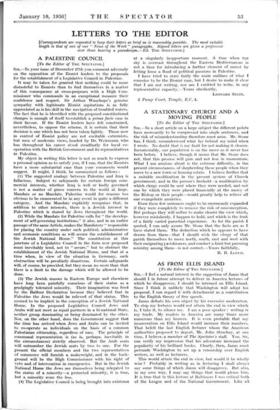A STATIONARY CHURCH AND A MOVING PEOPLE
[To the Editor of THE SPECTATOR.] SIR,—In a short article on a large subject the different points have necessarily to be compressed into single sentences, and the risk of misunderstanding therefore must arise. Mr. Stone has, I think, misunderstood what lay behind my mind when I wrote. No doubt that is my fault for not making it clearer. Incontestably, our population is on the move as it never has been before. I believe, though it seems that Mr. Stone does not, that this process will gain and not lose in momentum. What I am anxious about is the extreme difficulty, in the present circumstances, of shepherding these people when they move to a new town or housing estate. I believe further that a suitable modification in the present system of Church government, and in the parson's freehold—a modification by which clergy could be sent where they were needed, and not one by which they were placed financially at the mercy of the Bishop or their people—would greatly help to relieve alt our evangelistic anxieties.
Even these few sentences ought to be enormously expanded if they were completely to remove the risk of misconception. But perhaps they will suffice to make clearer the view which, however mistakenly, I happen to hold, and which is the fruit of a fairly varied parochial experience. As for the parish I quoted, I can only assure Mr. Stone that the facts are as I have stated them. The deduction which he appears to have drawn from them—that I should wish the clergy of that parish themselves to move north, south, east and west with their emigrating r arishioners, and conduct a faint but pursuing ministry among them—is not correct. —Yours faithfully,
II. B. LLOYD.










































 Previous page
Previous page